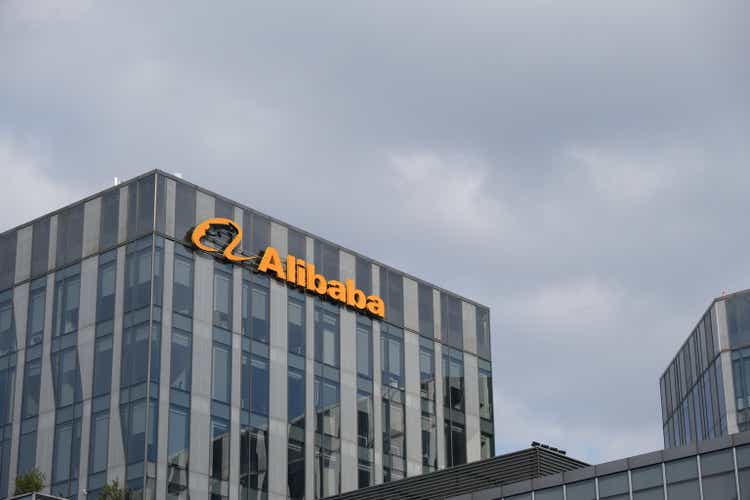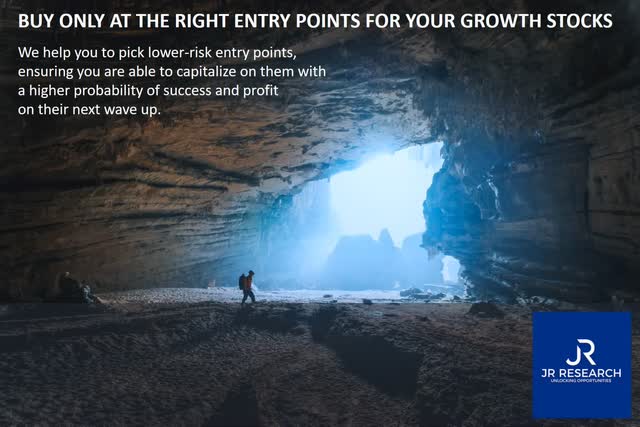Alibaba: SoftBank Runs, But You Shouldn't
Summary
- SoftBank is primed to cut its stake in Alibaba from about 14% to under 4%. The Masayoshi Son-led company wants to "limit its China exposure."
- BABA has sold off more than 10% since management announced its restructuring plans at the end of March. So investors who didn't chase the momentum surge have another chance now.
- We gleaned that BABA's $125 resistance level remains in play. Therefore, buying BABA well below that level is critical to improving risk/reward.
- Warren Buffett recently reminded investors how challenging it's to model geopolitical risks, even for a "fabulous enterprise" like TSMC.
- Therefore, investors must reflect a significant margin of safety for BABA and be demanding about it.
- I do much more than just articles at Ultimate Growth Investing: Members get access to model portfolios, regular updates, a chat room, and more. Learn More »
Robert Way
SoftBank Group Corp. (OTCPK:SFTBY) sent shockwaves through Asian markets today (April 13) as the financial media announced that the Masayoshi Son-led company would significantly pare down its stake in Alibaba Group Holding Limited (NYSE:BABA).
BABA has pulled back more than 10% since announcing its plans at the end of March to restructure into six distinct business groups to be "more agile, enhance decision making, and promote innovation to capture opportunities in their respective markets and industries."
As such, the initial euphoria bolstered by a potentially shareholder-accretive move has cooled slightly. Hence, it offers investors who didn't chase the recent momentum surge another opportunity to strike.
We updated investors in our previous article (Strong Buy) as we upgraded BABA, seeing that the consolidation back then was constructive, with buyers returning to support the stock.
It was also timely, published before the announcement of Alibaba's structural reorganization. Management aims to unlock more value for shareholders on top of its existing stock repurchase program.
However, Son's decision not to buy back the prepaid forward sales contracts of SoftBank's BABA shares could potentially lead to more volatility ahead for investors, even though BABA remains significantly undervalued.
Why? The Financial Times or FT reported that while SoftBank is going on the defensive after getting hammered by the tech bear market over the past year, the move is also seen as necessary to "limit its China exposure."
Notably, based on BABA's holdings as of 31 December 2022, SoftBank owned 13.7% of BABA and is its largest shareholder.
The move is estimated to slash SoftBank's holdings below 4%. As such, the move has also triggered further selling in BABA today in the Asian markets, down nearly 2.5% at writing in Hong Kong.
However, investors don't seem to be unduly concerned with the selloff, likely mitigated by BABA's significant undervaluation relative to the opportunities from spinning off its independent business entities moving forward.
In other words, we believe buyers will likely continue to use downside volatility to pick up the pieces from the panic sellers as Alibaba moves ahead to unlock value. Makes sense?
BABA last traded at a market cap of $242.8B. Analysts' estimates suggest that Alibaba Cloud could fetch $50B in valuation, while its Cainiao logistics unit could fetch about $20B in valuation.
Morningstar's sum-of-the-parts or SOTP valuation suggests a fair value of about $172, close to its DCF estimate of about $177.
Using a 5Y DCF EBITDA model with an exit multiple of 9.8x, we gleaned a fair value estimate of about $167.4. We believe the estimate is reasonable, predicated on a fairly conservative WACC of approximately 15.5%.
Despite that, the DCF models may not fully capture the geopolitical risks implied in its WACC, as modeling it accurately could be highly challenging.
As such, we believe it's helpful to consider where BABA's critical resistance is, as it identifies where market operators are not keen to lift its momentum further.
Warren Buffett reminded us just how difficult it is to model for geopolitical risks in an interview with CNBC recently, as he spoke about why Berkshire Hathaway (BRK.A) (BRK.B) decided to pare down most of its stake in Taiwan Semiconductor or TSMC (TSM).
Buffett re-assessed his stake in TSMC based entirely on the "geopolitical tensions between China and Taiwan," but not TSMC's "business, management, or anything of the sort." He reminded investors that "geopolitical conditions were outside the company's control." As a reminder, he described TSMC as a "fabulous enterprise."
Hence, we believe it's prudent for investors to reflect a significant margin of safety below BABA's well-established critical resistance level of $125, discussed in our previous article.
With BABA having fallen back to the mid-$90s level, it implies a margin of safety of about 25%, which is reasonable for a Buy rating, but no longer a Strong Buy candidate.
Hence, we encourage investors to consider leveraging the volatility of SoftBank's decision to cash in on most of its stake to pick up more exposure in BABA.
However, as BABA's price action is no longer optimal, investors should consider layering in progressively, taking advantage of dollar-cost averaging opportunities.
Rating: Buy (Revised from Strong Buy).
Important note: Investors are reminded to do their own due diligence and not rely on the information provided as financial advice. The rating is also not intended to time a specific entry/exit at the point of writing unless otherwise specified.
We Want To Hear From You
Have additional commentary to improve our thesis? Spotted a critical gap in our thesis? Saw something important that we didn't? Agree or disagree? Comment below and let us know why, and help everyone to learn better!
Editor's Note: This article discusses one or more securities that do not trade on a major U.S. exchange. Please be aware of the risks associated with these stocks.
A Unique Price Action-based Growth Investing Service
- We believe price action is a leading indicator.
- We called the TSLA top in late 2021.
- We then picked TSLA's bottom in December 2022.
- We updated members that the NASDAQ had long-term bearish price action signals in November 2021.
- We told members that the S&P 500 likely bottomed in October 2022.
- Members navigated the turning points of the market confidently in our service.
- Members tuned out the noise in the financial media and focused on what really matters: Price Action.
Sign up now for a Risk-Free 14-Day free trial!

This article was written by
JR research was featured as one of Seeking Alpha's leading contributors in 2022. See: https://seekingalpha.com/article/4578688-seeking-alpha-contributor-community-2022-by-the-numbers
Unlock the key insights to growth investing with JR Research - led by founder and lead writer JR. Our dedicated team is focused on providing you with the clarity you need to make confident investment decisions.
Transform your investment strategy with our popular Investing Groups service.
Ultimate Growth Investing specializes in a price action-based approach to uncovering the opportunities in growth and technology stocks, backed by actionable fundamental analysis.
We believe price action is a leading indicator.
Price action analysis is a powerful and versatile toolkit for the informed investor because it can be used to analyze any publicly traded security. As such, it offers investors with invaluable insights into understanding market behavior and sentiments.
Plus, stay ahead of the game with our general stock analysis across a wide range of sectors and industries.
Improve your returns and stay ahead of the curve with our short- to medium-term stock analysis.
We not only identify long-term potential but also seize opportunities to profit from short-term market swings, using a combination of long and short set-ups.
Join us and start seeing experiencing the quality of our service today.
Lead writer JR's profile:
I was previously an Executive Director with a global financial services corporation. I led company-wide award-winning wealth management teams that were consistently ranked among the best in the company.
I graduated with an Economics Degree from National University of Singapore [NUS]. NUS is Asia's #1 university according to Quacquarelli Symonds [QS] annual higher education ranking. It also held the #11 position in QS World University Rankings 2022.
I'm also a Commissioned Officer (Reservist) with the Singapore Armed Forces. I was the Battalion Second-in-command of an Armored Regiment. I currently hold the rank of Major. I graduated as the Distinguished Honor Graduate from the Armor Officers' Advanced Course as I finished first in my cohort of Armor officers. I was also conferred the Best in Knowledge award.
My LinkedIn: www.linkedin.com/in/seekjo
Analyst’s Disclosure: I/we have a beneficial long position in the shares of BABA, BRK.B either through stock ownership, options, or other derivatives. I wrote this article myself, and it expresses my own opinions. I am not receiving compensation for it (other than from Seeking Alpha). I have no business relationship with any company whose stock is mentioned in this article.
Seeking Alpha's Disclosure: Past performance is no guarantee of future results. No recommendation or advice is being given as to whether any investment is suitable for a particular investor. Any views or opinions expressed above may not reflect those of Seeking Alpha as a whole. Seeking Alpha is not a licensed securities dealer, broker or US investment adviser or investment bank. Our analysts are third party authors that include both professional investors and individual investors who may not be licensed or certified by any institute or regulatory body.

